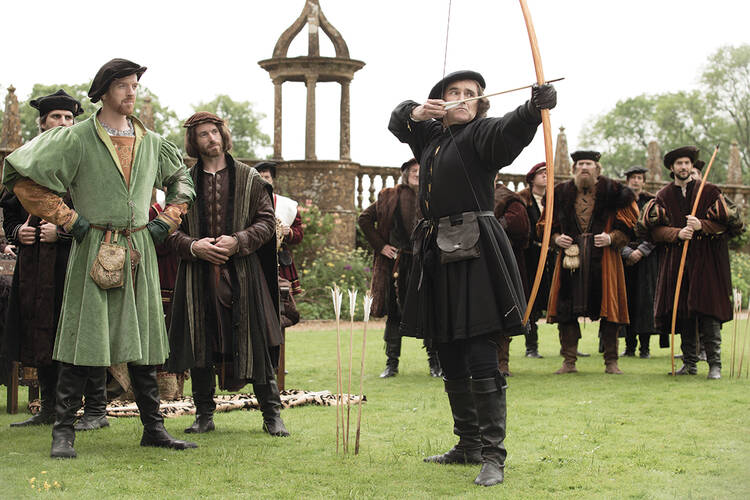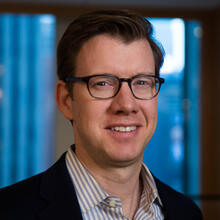Thomas Cromwell may have been a conniving, loathsome character in Robert Bolt’s “A Man for All Seasons,” but the advisor to King Henry VIII was granted redemption by Hilary Mantel in her novels Wolf Hall and Bringing Up the Bodies. (A third novel, The Mirror and the Light, is in the works.) Cromwell is the unlikely hero of these stories, his famous Hans Holbein portrait fully brought to life. Now Cromwell has received perhaps the greatest honor a British historical figure can be granted: a starring role in a Masterpiece drama. In a rare cultural coincidence, a stage version is also now playing in New York.
Imported from England on the heels of the sixth season of “Downton Abbey,” Wolf Hall (starting in April on PBS) is a six-part study of the mysterious and brilliant Cromwell, played here by the equally brilliant Mark Rylance. That Cromwell’s elevation comes largely at the expense of Sir Thomas More is no small matter. More (Anton Lesser) is portrayed here as a pious and slippery fellow, a sign perhaps of Mantel’s own distaste for the church and her saints. (For a more accurate take on More, see Eamon Duffy’s review of “Wolf Hall” in The Tablet, Jan. 29.) But it is hard not to be won over by “Wolf Hall,” especially with the cast on hand. Jonathan Pryce as Cardinal Wolsey! Sargent Brody as Henry VIII! If you are looking to banish Showtime’s “The Tudors” from your pop-historical memory, here is your chance.
Cromwell is a man of few words, but his words are sharp and well chosen. He is the son of a blacksmith, a fact routinely noted by his detractors, but he has studied to become a lawyer and makes his way into the employ of Cardinal Wolsey. He is fiercely loyal to Wolsey even when others abandon him. (The story is familiar: Henry wants to annul his marriage, but Wolsey can’t obtain the proper approval from Rome.) Yet Cromwell is not a martyr either. He stays true to the cardinal up until the very moment a more powerful patron seeks his services.
In Mantel’s books Cromwell possesses a charisma that would seem difficult to translate on screen. He is a whirlwind of activity but not a man who woos women or makes great speeches. As played by Rylance, however, you can see why young students want to study with him and live on his estate. Cromwell is an unusually successful businessman, someone who gets things done. He walks with purpose, and even the way he writes a letter seems imbued with strength and meaning. He does not seem scared of anything.
“Wolf Hall” is, in many ways, an apology for the burgeoning English state. Where else but England could the son of a blacksmith become an advisor to the king? Not France surely, where Henry complains that the king can tax his subjects to kingdom come. (Well, at least until 1789.) King Henry must go through Parliament to fund his wars. But the democratic impulse that Parliament represents, faint though it may be, is what allows a man like Cromwell to flourish. As one character remarks over drinks by the fire, evaluating the prospect of a Queen Anne Boleyn, “A world where Anne can be queen is a world where Cromwell can be....”
The series also suggests that England was correct to part ways with Rome. In a private conversation with the king, Cromwell offers a damning indictment of monastic life. The monks raise money for the poor and then spend it on themselves, and force their would-be students to serve as their staff. His words, of course, are exactly what the young king wants to hear. Dissolution looms.
These religious controversies emerge from natural human drama. When Cromwell receives a package in the mail, his wife eyes him warily as he opens up a Bible. It is William Tyndale’s English translation of Scripture, a document that, if found in Cromwell’s possession, could lead to imprisonment or worse. Mantel cannot resist a dig at Rome: “Read it and see how you’re misled. No mention of nuns, monks, relics. No mention of popes,” Cromwell says. But he is also a careful man, and when he meets with Thomas More for dinner, he does not admit to reading Tyndale. When he hears, at one point, that Tyndale is in Hamburg, he does not want to acknowledge it, knowing that he is a fugitive. Cromwell is torn between the demands of the state and his own conscience. “Wolf Hall” is in part the story of his own carefully calibrated attempts to reconcile those two impulses.
It is difficult not to contrast “Wolf Hall” with “A Man for All Seasons.” They are almost diametrically opposed takes on the same historical events. But what unites them is a love for language. In the film Paul Scoffield’s Thomas More was granted line after line of smoothly polished dialogue. He may not have often seemed very human, but boy, was he eloquent. (“Why Richard, it profits a man nothing to give his soul for the whole world...but for Wales?”) Cromwell shares a flare for bons mots. “Are her teeth good?” Cromwell’s maid asks after he visits with Anne Boleyn. “When she sinks her teeth into me I’ll let you know,” Cromwell snaps. When one of Wolsey’s aides prays to God for justice for the wronged cardinal, Cromwell answers, “No need to trouble God. I’ll take it in hand.”
What form justice will take is unclear at the end of the first two installments of “Wolf Hall.” (The final four were not made available to the press.) Aside from historical intrigue, “Wolf Hall” offers something else worth contemplating. In one of the book’s most telling bits of dialogue, replayed here, the Duke of Norfolk complains, “Cromwell, why are you such a person?” The actor, Bernard Hill, spits out that last word in disgust. “It is not as if you can afford to be,” he says. “Wolf Hall” is at its heart the celebration of a single individual. You may not always agree with Thomas Cromwell, but it is impossible to deny his right to exist.








